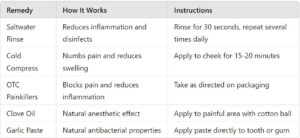Tooth pain can range from mild discomfort to severe, debilitating agony. When you’re struck with unbearable tooth pain, it’s crucial to know what to do at home before you can see a dentist. This guide explores effective remedies and tips to help alleviate pain in the short term while shedding light on when to seek immediate medical attention.
Understanding the Causes of Unbearable Tooth Pain
Tooth pain can stem from various issues, each requiring different forms of treatment. Common causes include:
- Tooth Decay: The most frequent cause, cavities expose nerves, leading to sharp pain.
- Gum Disease: Inflammation of the gums can cause significant discomfort.
- Abscess: A severe infection at the root of the tooth or between the gum and tooth.
- Tooth Fracture: A cracked or broken tooth can cause immense pain.
- Teeth Grinding: Constant pressure on teeth can lead to wear and tear.
- Sinus Infections: Occasionally, sinus infections cause upper tooth pain due to pressure on the sinuses.
While it’s vital to address the root cause, you can manage unbearable tooth pain at home to reduce discomfort.
Immediate Actions: What to Do at Home
When the pain strikes suddenly and intensifies, here’s what you can do at home to ease unbearable tooth pain.
1. Rinse with Salt Water
One of the most effective and accessible remedies is rinsing with salt water. Salt water can act as a natural disinfectant and help reduce inflammation and bacteria in your mouth.
How to use:
- Dissolve 1 teaspoon of salt in a cup of warm water.
- Rinse your mouth for 30 seconds, ensuring the solution reaches the painful area.
- Repeat several times a day.
Why it works: Saltwater rinses can reduce swelling and offer temporary relief, particularly if the pain is caused by gum inflammation or infection.
2. Apply a Cold Compress
For swelling and throbbing pain, applying a cold compress can offer quick relief. It numbs the area and reduces inflammation, which is often a key component of unbearable tooth pain.
How to use:
- Wrap a towel around a bag of ice or a cold pack.
- Hold it against the outside of your cheek near the painful area for 15-20 minutes.
- Repeat every few hours.
Why it works: Cold compresses restrict blood flow to the area, which helps to numb the pain and reduce swelling.
3. Over-the-Counter Painkillers
Over-the-counter (OTC) medications like ibuprofen or acetaminophen are excellent for providing temporary relief from tooth pain.
How to use:
- Follow the dosing instructions on the medication packaging.
- Consider alternating between ibuprofen and acetaminophen to manage pain if one alone is insufficient.
Why it works: OTC medications reduce inflammation and block pain signals, offering much-needed relief.
4. Clove Oil for Natural Relief
Clove oil has been used for centuries to alleviate tooth pain. It contains eugenol, a natural anesthetic that can numb the affected area.
How to use:
- Dab a small amount of clove oil on a cotton ball.
- Apply it directly to the painful tooth or gum.
- You can also mix clove oil with a carrier oil (such as olive oil) to dilute it if the sensation is too strong.
Why it works: Eugenol in clove oil provides a numbing effect, making it an effective temporary solution for unbearable tooth pain.
5. Garlic Paste
Garlic has natural antibacterial properties that can help reduce pain and fight infection.
How to use:
- Crush a garlic clove to form a paste.
- Apply the paste to the painful tooth or surrounding gum area.
- Leave it on for several minutes before rinsing your mouth with water.
Why it works: Garlic contains allicin, which has antibacterial and pain-relieving properties that can soothe tooth pain caused by infection.
When to Seek Professional Help
While these home remedies can provide temporary relief, it’s essential to know when to seek immediate dental care. Prolonged tooth pain, fever, or swelling that extends to the face, neck, or jaw may indicate a more serious condition like an abscess, which requires immediate medical attention. If unbearable tooth pain lasts for more than 48 hours or worsens, contact a dentist promptly.
Emergency Warning Signs:
- Severe, persistent tooth pain
- Swelling in the face or jaw
- Difficulty swallowing or breathing
- Fever accompanying the toothache
Ignoring these symptoms could lead to more severe complications, including systemic infections or even sepsis.
Preventive Measures to Avoid Future Tooth Pain
Taking preventive action is the best way to avoid the agony of tooth pain. Here are some tips:
1. Maintain Proper Oral Hygiene
Brushing twice daily, flossing, and using an antibacterial mouthwash can help prevent cavities and gum disease, both leading causes of tooth pain.
2. Regular Dental Checkups
Visiting the dentist for cleanings and checkups at least twice a year can catch problems before they become severe.
3. Avoid Hard or Chewy Foods
Avoid chewing on hard foods like ice or popcorn kernels, which can fracture or break teeth, causing pain.
4. Manage Stress and Teeth Grinding
Stress can lead to bruxism (teeth grinding), which causes pain and damage to teeth. Consider using a nightguard if you grind your teeth during sleep.
This table summarizes the most effective home remedies, offering quick guidance on how to address unbearable tooth pain:

FAQs:
- What is the fastest way to relieve unbearable tooth pain at home? Over-the-counter painkillers combined with a cold compress can offer the fastest relief for unbearable tooth pain.
- Can salt water rinse help with tooth pain? Yes, salt water can reduce inflammation and bacteria, offering temporary relief from tooth pain.
- How long should I try home remedies before seeing a dentist? If the pain lasts more than 48 hours or worsens, contact a dentist for professional treatment.
- Is clove oil effective for tooth pain relief? Yes, clove oil contains eugenol, a natural anesthetic that can numb the area and temporarily alleviate tooth pain.
Conclusion
Dealing with unbearable tooth pain at home can be challenging, but with the right remedies, you can reduce discomfort before seeking professional help. From saltwater rinses to cold compresses and natural solutions like clove oil, these methods provide temporary relief. However, if pain persists or worsens, it’s crucial to visit your dentist to identify and treat the underlying issue. Remember, prevention through proper oral hygiene and regular dental visits is the best way to avoid future tooth pain.





